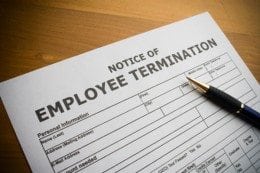- leadership
- Blog post
Terminating problem employees: 4 lousy excuses for failing to fire
Editor’s note: This week, guest blogger Patrick DiDomenico addresses letting problem employees go.
As a manager, you’ll eventually have to deal with a problem employee – either someone who chronically underperforms or habitually misbehaves. While some struggling employees improve their behavior with coaching and intervention, the reality is that some don’t.
Despite problem employees’ refusal to change their behavior – not to mention their negative impact on business – many organizations hesitate to let these employees go.
Here are four lousy excuses for failing to terminate the people who are hurting your organization, along with reality checks on each excuse:
1. “I need him.” The poor-performing employee has an indispensable skill or connection that you don’t want your organization to lose.
Reality: Problem employees, regardless of their unique talents, don’t justify their costs. You can likely replace them with people who have similar skills – and will fulfill the expectations of their position.
2. “That would be punishing her.” When workers are counseled on their performance or behavioral problems, but fail to improve and are fired, some supervisors think they are playing the heavy. This is simply not true.
Reality: Discipline is not the same as punishment. It’s your responsibility as a representative of your organization’s management to discipline problem employees appropriately, up to and including termination.
3. “I feel sorry for him.” If you find out the employee’s performance or behavioral shortcomings are the result of a personal matter, you might feel bad about adding the issue of unemployment.
Reality: It’s not your job to console the employee. You can and should, however, refer him to an appropriate resource, so he can get the help he needs.
4. “It’s my fault.” Some supervisors believe the employee’s inability to do a good job reflects badly on their own ability to hire good people or manage them.
Reality: If you were so inclined, you could blame everything that goes wrong in your department on yourself. But that would be both unfair and counterproductive. If you’ve tried to help the employee improve – through coaching, performance improvement plans, progressive discipline, and/or referring the problem to HR as appropriate – her failure is not on you. Evaluate the steps you took and move on.
Patrick DiDomenico is the Editorial Director at Business Management Daily and the founding editor of The HR Specialist family of newsletters, special reports and online resources. In 15+ years as a business journalist and thought leader, he’s been a newspaper reporter, Washington speechwriter and White House press aide. You can connect with Pat via Twitter @HREmploymentLaw.

Get a demo of all our training features
Connect with an expert for a one-on-one demonstration of how BTS Total Access can help develop your team.



